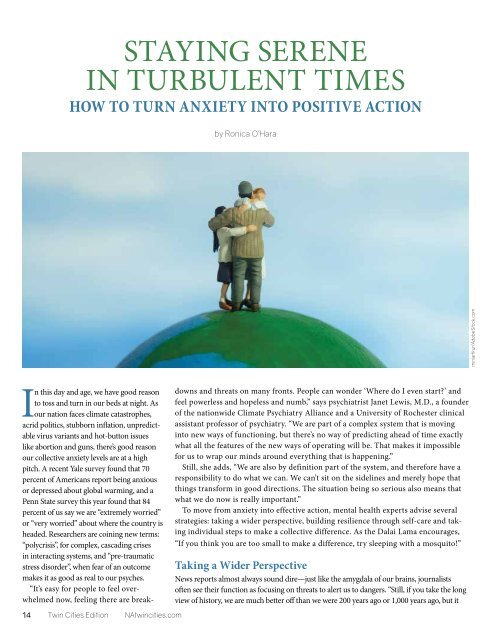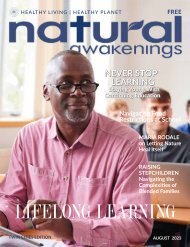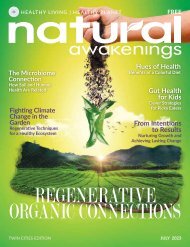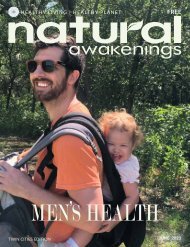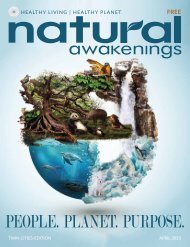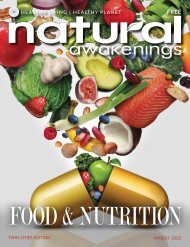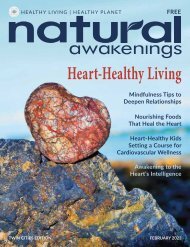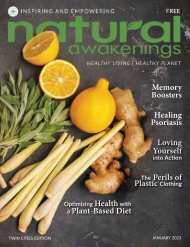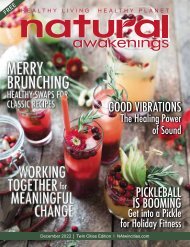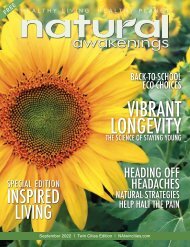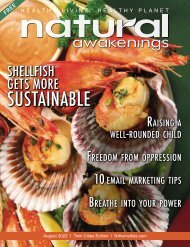Natural Awakenings Twin Cities November 2022
Read the November 2022 edition of Natural Awakenings Twin Cities magazine. This is our annual Mental Health and Well-being Issue which features articles on staying calm during turbulent times, self-care strategies for anxiety, art therapy for kids, mushrooms and herbs for mental wellness, healing mental health in the new age, grief on the healthcare frontlines and so much more. Be sure to check out our local content, including News Briefs announcements, Community Resource Guide with providers throughout the metro who can meet your individual wellness needs, and all the happenings in the Calendar of Events. There is additional online-only content that can be found at NATwinCities.com.
Read the November 2022 edition of Natural Awakenings Twin Cities magazine. This is our annual Mental Health and Well-being Issue which features articles on staying calm during turbulent times, self-care strategies for anxiety, art therapy for kids, mushrooms and herbs for mental wellness, healing mental health in the new age, grief on the healthcare frontlines and so much more.
Be sure to check out our local content, including News Briefs announcements, Community Resource Guide with providers throughout the metro who can meet your individual wellness needs, and all the happenings in the Calendar of Events. There is additional online-only content that can be found at NATwinCities.com.
You also want an ePaper? Increase the reach of your titles
YUMPU automatically turns print PDFs into web optimized ePapers that Google loves.
STAYING SERENE<br />
IN TURBULENT TIMES<br />
HOW TO TURN ANXIETY INTO POSITIVE ACTION<br />
by Ronica O’Hara<br />
miniartkur/AdobeStock.com<br />
In this day and age, we have good reason<br />
to toss and turn in our beds at night. As<br />
our nation faces climate catastrophes,<br />
acrid politics, stubborn inflation, unpredictable<br />
virus variants and hot-button issues<br />
like abortion and guns, there’s good reason<br />
our collective anxiety levels are at a high<br />
pitch. A recent Yale survey found that 70<br />
percent of Americans report being anxious<br />
or depressed about global warming, and a<br />
Penn State survey this year found that 84<br />
percent of us say we are “extremely worried”<br />
or “very worried” about where the country is<br />
headed. Researchers are coining new terms:<br />
“polycrisis”, for complex, cascading crises<br />
in interacting systems, and “pre-traumatic<br />
stress disorder”, when fear of an outcome<br />
makes it as good as real to our psyches.<br />
“It’s easy for people to feel overwhelmed<br />
now, feeling there are break-<br />
14 <strong>Twin</strong> <strong>Cities</strong> Edition NAtwincities.com<br />
downs and threats on many fronts. People can wonder ‘Where do I even start?’ and<br />
feel powerless and hopeless and numb,” says psychiatrist Janet Lewis, M.D., a founder<br />
of the nationwide Climate Psychiatry Alliance and a University of Rochester clinical<br />
assistant professor of psychiatry. “We are part of a complex system that is moving<br />
into new ways of functioning, but there’s no way of predicting ahead of time exactly<br />
what all the features of the new ways of operating will be. That makes it impossible<br />
for us to wrap our minds around everything that is happening.”<br />
Still, she adds, “We are also by definition part of the system, and therefore have a<br />
responsibility to do what we can. We can’t sit on the sidelines and merely hope that<br />
things transform in good directions. The situation being so serious also means that<br />
what we do now is really important.”<br />
To move from anxiety into effective action, mental health experts advise several<br />
strategies: taking a wider perspective, building resilience through self-care and taking<br />
individual steps to make a collective difference. As the Dalai Lama encourages,<br />
“If you think you are too small to make a difference, try sleeping with a mosquito!”<br />
Taking a Wider Perspective<br />
News reports almost always sound dire—just like the amygdala of our brains, journalists<br />
often see their function as focusing on threats to alert us to dangers. “Still, if you take the long<br />
view of history, we are much better off than we were 200 years ago or 1,000 years ago, but it


